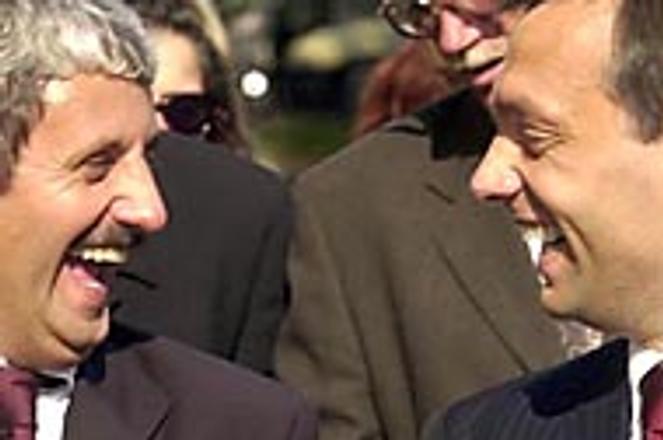Mikuláš Dzurinda with his Hungarian counterpart Viktor Orban, right.photo: TASR
The Deputy Foreign Minister Jaroslav Chlebo says Slovakia is ready to go the International Court in Strasbourg if the controversial Act on Hungarians living in neighbouring countries takes effect in its current form.
Speaking at a press conference on November 6, Chlebo said that unless a compromise was reached on several clauses of the act Slovakia would make an international protest.
Slovakia and Romania have both expressed concerns about the act which the Hungarian Parliament on June 19. The act aims to "ensure that Hungarians living in neighbouring countries form part of the Hungarian nation as a whole and to promote their well-being and awareness of national identity within their home country."
Ladislav Orosz, a member of the parliamentary constitutional legal committee, said the act was in conflict with international legal norms. "The problem with the law is the principle of extra-territoriality which means that it would be effective on the territory of another state," he said.
The act will take effect January 1, 2002, and will apply to "persons declaring themselves to be of Hungarian nationality" living in Croatia, Yugoslavia, Romania, Slovenia, Slovakia and Ukraine, their spouses and children raised in their common households.
These people can apply for a Hungarian Nationality certificate and will be granted advantages by the Hungarian state, such as education subsidies for their children, provided they attend Hungarian speaking schools.
They will also be entitled to health care services in Hungary and a series of travel benefits.
Slovakia's Hungarian Coalition Party vice-chair László Guyrovszky said that the law did not interfere with Slovakia's national interests. He said: "It simply offers advantages to people who are interested in making use of the advantages. It's up to Hungary to decide what it wants to spend its taxpayer money on."
But Chelbo maintains: "By approving such law Hungary is undermining the basic bilateral Slovak-Hungarian treaty [signed in 1995]."
Shortly after the act was passed Romanian and Hungarian leaders asked the European Commission for Democracy Through Law - the so called Venice commission (VC) , to resolve the dispute.
In the October 20 report on preferential treatment of national minorities by their kin-states, the VC concluded that: "Responsibility for minority protection lies primarily with the home-States."
But it cautioned that "kin-States also play a role in the protection and preservation of their kin-minorities, aiming at ensuring that their genuine linguistic and cultural links remain strong.
"The adoption by states of unilateral measures granting benefits to the persons belonging to their kin-minorities is only legitimate if the principles of territorial sovereignty of states, friendly relations amongst states and the respect of human rights and fundamental freedoms are respected."
Participants of an October 26 Hungarian Standing Conference (HST) which included Hungarian Government and political representatives considered the report a confirmation that "the act is in conformity with European thought and practice, as well as the general principles of international law."
However, Chlebo insists that the act contradicts the VC's report and he is due to discuss the issue on November 16 at a meeting with Zsolt Németh, Hungarian Deputy Foreign Ministry.
Rudolf Chmel, who served as Czech and Slovak Federative Republic ambassador to Hungary between 1990 and 1992, said: "It is unfortunate that before approving the act the Hungarians didn't initiate consultations with any neighbouring countries which were to be influenced by it."


